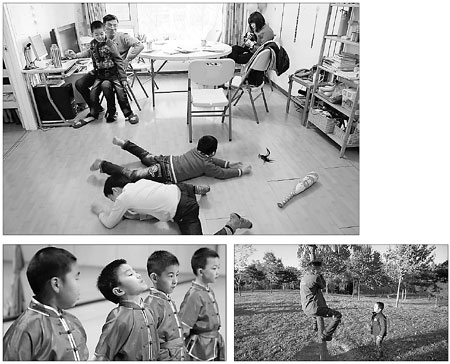 |
| Zhang Qiaofeng arrived upon the idea of home schooling after contrasting two photos of his son - one taken before he entered primary school and another shot a month after he started - and noticing a vast difference in the boy's apparent mood. Zhang teaches the boys Chinese, math and English himself. He hires professional tutors to teach them soccer, swimming, martial arts, calligraphy, chess and fine arts. He also arranges such activities as tree climbing to teach bravery. (China News Service/ Liu Guanguan) |
Home-schooled children generally have broader and deeper knowledge but typically lag in certain subjects, such as math, says Yuan Fangyan, a researcher with 21st Century Education Research Institute, a nonprofit focused on China's home schooling. Their social skills also suffer, she says.
"Most parents who home-school later believe they made the right choice because they get good results," she explains. "But without a high school diploma, you can't take the National College Entrance Examination."
It ultimately depends not only on the parents' pedagogical philosophy but also on their worldviews.
"Why must we find a path to drag our children along?" asks Song Xiayan, a 39-year-old mother who founded a home schooling group in Yunnan province's Dali in 2010.
"And why does everyone have to go to college? The key to home education is to disregard the social regiment and create your own ways of living."
That, she believes, is one of the most important lessons parents can teach their children - and one kids will never learn in school.

 Storms leave 97 dead, 58 missing in Mexico
Storms leave 97 dead, 58 missing in Mexico New model of indigenous surface-to-air missiles testfired
New model of indigenous surface-to-air missiles testfired  118.28-carat diamond to be auctioned in HK
118.28-carat diamond to be auctioned in HK Maternal love under streetlight
Maternal love under streetlight Naked foreign student sits in the middle of a road in Haikou
Naked foreign student sits in the middle of a road in Haikou  Colorful Yunnan: Enjoy the natural beauty
Colorful Yunnan: Enjoy the natural beauty Harbin named Chinese city with most beautiful women
Harbin named Chinese city with most beautiful women New college students' military training in Guangzhou
New college students' military training in Guangzhou Rugby girls
Rugby girls PLA's 38th Group Army conduct training
PLA's 38th Group Army conduct training Residences of the royal house of Savoy
Residences of the royal house of Savoy The last days of Wan Aihua
The last days of Wan Aihua Highlights at 12th National Games of China
Highlights at 12th National Games of China Beijing Film Academy welcomes freshmen
Beijing Film Academy welcomes freshmen Large mahjong party sets new world record
Large mahjong party sets new world recordDay|Week|Month